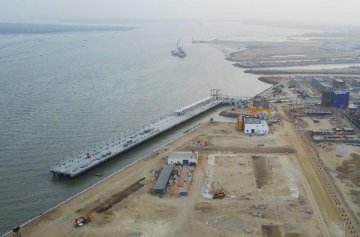SANTIAGO, Sept. 27 (Xinhua) -- The inclusion of Latin American and Caribbean countries in China-proposed Belt and Road Initiative is an example of multilateral cooperation for shared benefits against the backdrop of rising unilateralism, a senior United Nations official said recently.
The initiative proposed in 2013 by Chinese President Xi Jinping has been key to achieving more balanced and inclusive global cooperation, Alicia Barcena, executive secretary of the Economic Commission for Latin America and the Caribbean (ECLAC), said in an interview on the occasion of the 75th anniversary of the UN's founding.
The initiative's emphasis on cooperation and joint action to spur global development is in line with the principles of the UN, which has made headway in fighting hunger, promoting peace and human rights, and mediating to save lives in hundreds of conflicts and disasters, said Barcena.
Over the course of 75 years, the UN "has made progress in international cooperation, but not enough," she said.
The COVID-19 pandemic has revealed "very prominent fragilities, and a very divided and fractured world, where we are experiencing perhaps one of the toughest moments in relation to multilateralism and cooperation," said Barcena.
That is why Xi's recent remarks at the UN General Assembly, in which he "made a strong call for multilateralism, dialogue and cooperation," were so opportune, she said.
What's more, many of the concrete announcements made by China, including establishing a UN Global Geospatial Knowledge and Innovation Center and an International Research Center of Big Data, are "all aligned with the Sustainable Development Goals" promoted by the UN towards the year 2030, the executive secretary said.
In addition, China will offer 50 million U.S. dollars to the UN's COVID-19 Global Humanitarian Response Plan and extend the China-UN Peace and Development Trust Fund by five years.
Barcena said the Latin American region has seen China's interest in expanding investments to more areas, and "that is very important for us," she noted.
The recovery of China's economic dynamism will have positive repercussions on Latin American economies, given China's "fundamental" importance as a regional trade partner, she said.
According to Gerry Rice, spokesman of International Monetary Fund, considering the better-than-expected economic data from China and other advanced economies, the global economic outlook is less dire than three months ago.
To date, nearly Latin American and Caribbean countries have signed memorandums of understanding for the joint construction of the Belt and Road Initiative with China.
Founded in 1948, the ECLAC is a UN regional commission tasked to encourage economic cooperation in the region and promote ties with countries in other regions.




















Latest comments